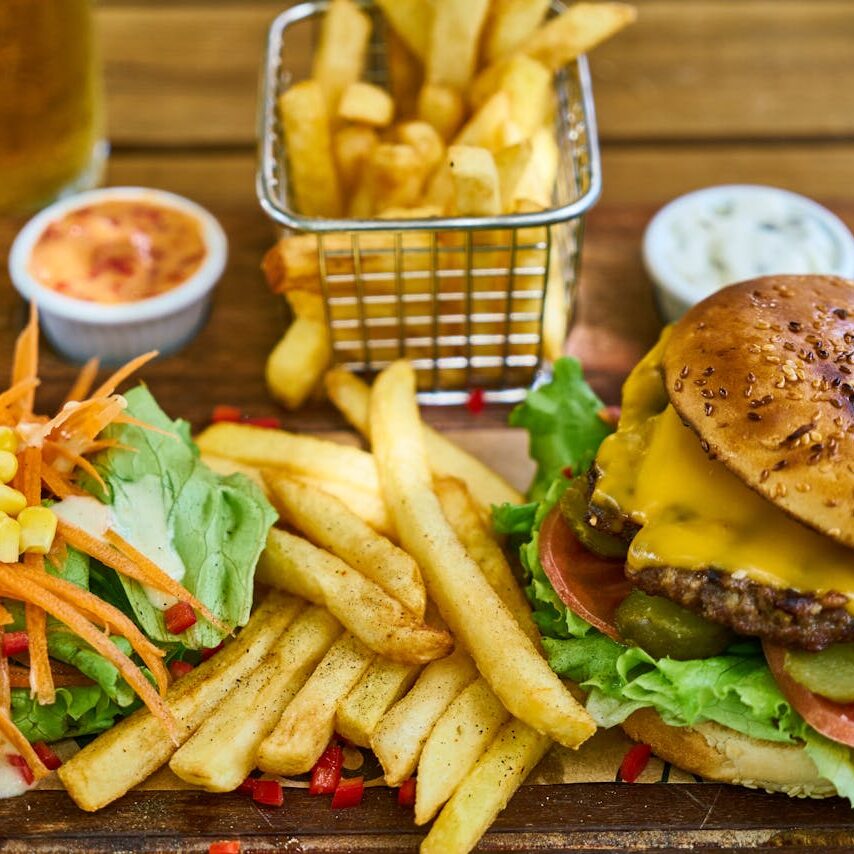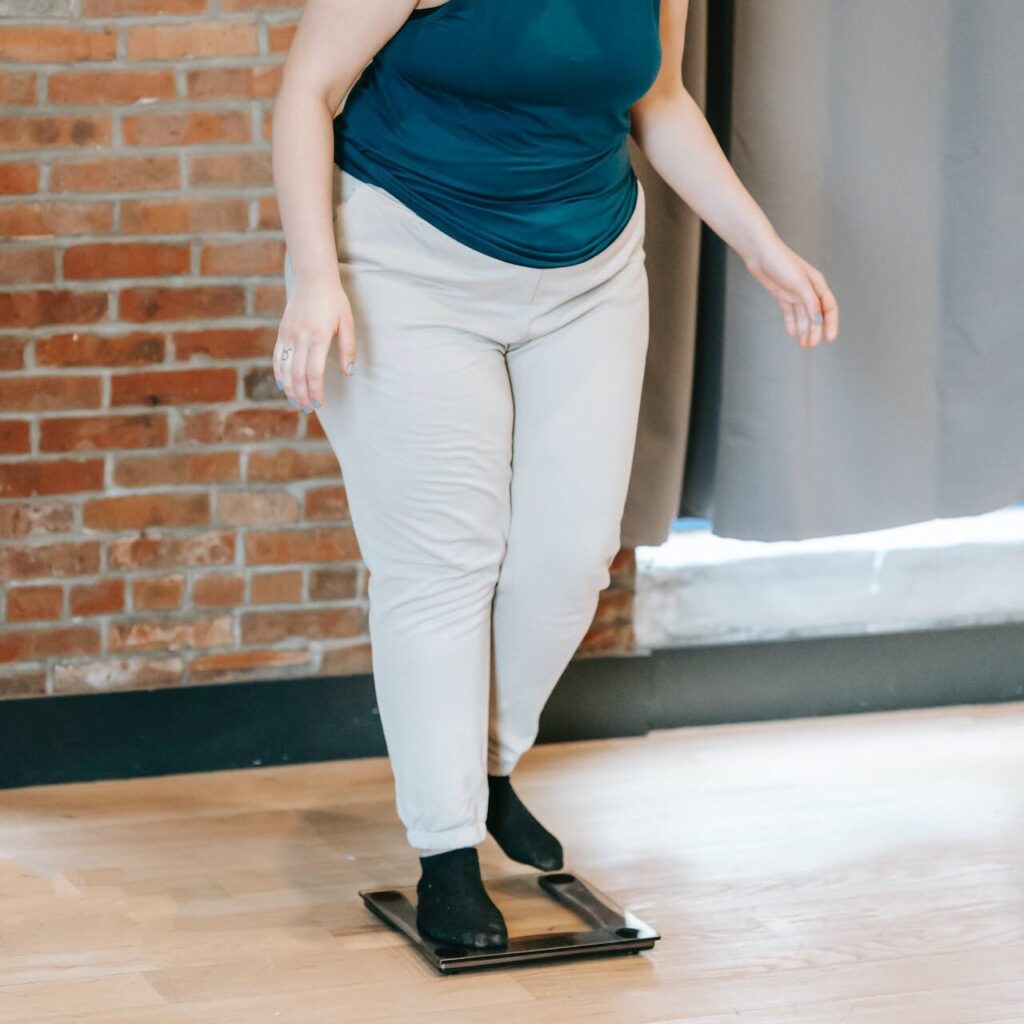Top 5 Effective Ways to Lose Weight: and Keep It Off Losing weight is a common goal for many people, but it can also be a challenging one. Many people struggle to lose weight or regain it after a short period of time. This can be frustrating and demoralizing, and it may affect your health and well-being.
However, losing weight and keeping it off is not impossible. There are some effective ways to achieve and maintain a healthy weight, without resorting to extreme diets, pills, or surgery. These ways are based on scientific evidence and proven results, and they can help you improve your lifestyle, habits, and mindset.
In this blog, we will share with you the top 5 effective ways to lose weight and keep it off. These are:
Table of Contents
#1. Top 5 Effective Ways to Lose Weight: Eating a balanced and nutritious diet

- Eat a balanced and nutritious diet
- Exercise regularly and moderately
- Drink plenty of water and limit alcohol
- Manage your stress and sleep well
- Track your progress and celebrate your achievements
Let’s take a closer look at each of these ways and how they can help you reach your weight loss goals.One of the most important factors in weight loss is your diet. What you eat and how much you eat can have a huge impact on your calorie intake, your metabolism, your hunger, and your nutrition. Therefore, you need to pay attention to your food choices and portions, and make sure you are eating a balanced and nutritious diet.
A balanced and nutritious diet is one of the most effective ways to lose weight. This includes a variety of foods from all the food groups, such as:
- Lean proteins, such as chicken, fish, eggs, tofu, beans, and lentils
- Healthy fats, such as olive oil, avocado, nuts, seeds, and fatty fish
- Complex carbohydrates, such as whole grains, oats, quinoa, fruits, and vegetables
- Fiber, which is found in fruits, vegetables, legumes, nuts, seeds, and whole grains
- Micronutrients, such as vitamins, minerals, antioxidants, and phytochemicals, which are found in fruits, vegetables, herbs, spices, and other plant-based foods
These foods can provide you with the energy, nutrients, and satiety you need to lose weight and stay healthy. They can also help you prevent or manage various health conditions, such as diabetes, heart disease, and cancer.
On the other hand, you should limit or avoid foods that are high in calories, fat, sugar, and salt, such as:

- Processed foods, such as chips, cookies, cakes, candy, soda, and fast food
- Refined carbohydrates, such as white bread, white rice, pasta, and pastries
- Added sugars, such as table sugar, honey, maple syrup, and sweetened beverages
- Trans fats, which are found in margarine, shortening, baked goods, and fried foods
- Alcohol, which is high in calories and can impair your judgment and metabolism,
These foods can contribute to weight gain, inflammation, and chronic diseases. They can also increase your cravings, hunger, and blood sugar levels.
To eat a balanced and nutritious diet, you should follow these tips:
- Eat at least three meals a day, and avoid skipping breakfast
- Eat smaller and more frequent meals, and avoid overeating or undereating
- Eat slowly and mindfully, and stop when you are full
- Plan your meals and snacks ahead of time, and prepare them at home as much as possible
- Choose fresh, whole, and natural foods over processed, packaged, and artificial ones
- Read nutrition labels and ingredient lists, and avoid foods with added sugars, trans fats, and preservatives
- Use healthy cooking methods, such as baking, grilling, steaming, or roasting, and avoid frying or deep-frying
- Use herbs, spices, lemon, vinegar, or salsa to flavor your food, and avoid salt, butter, cream, or cheese
- Use smaller plates, bowls, and utensils, and avoid serving yourself more than once
- Drink water, tea, or coffee before or during your meals, and avoid drinking calories from juice, soda, or alcohol
#2. Exercise regularly and moderately

Another key factor in weight loss is your physical activity. Exercise is one of the top 5 effective ways to lose weight and keep it off. You burn calories, boost your metabolism, build muscle, and improve your health and fitness. It can also help you reduce stress, improve your mood, and enhance your self-esteem.
However, not all exercise is equal. Some types of exercise are more effective than others for weight loss and maintenance. You need to find the right balance between the intensity, frequency, and duration of your exercise and match it with your goals, preferences, and abilities.
The best type of exercise for weight loss and maintenance is a combination of aerobic and anaerobic exercises. Aerobic exercise is any activity that increases your heart rate and breathing, such as walking, jogging, cycling, swimming, or dancing. Anaerobic exercise is any activity that involves short bursts of high-intensity effort, such as lifting weights, doing push-ups, or sprinting.
Aerobic exercise can help you burn fat, improve your cardiovascular health, and lower your blood pressure and cholesterol. Anaerobic exercise can help you build muscle, increase your strength and endurance, and raise your metabolic rate. Muscle is more metabolically active than fat, which means it burns more calories even at rest.
To exercise regularly and moderately, you should follow these tips:
- Aim for at least 150 minutes of moderate-intensity aerobic exercise or 75 minutes of vigorous-intensity aerobic exercise per week, according to the Physical Activity Guidelines for Americans1
- Do some strength training exercises at least twice a week, targeting all the major muscle groups, such as your arms, legs, chest, back, and core
- Choose activities that you enjoy and that fit your lifestyle and schedule
- Vary your routine and try new things to avoid boredom and plateaus
- Warm up before and cool down after each session to prevent injuries and soreness
- Listen to your body and adjust your intensity and duration according to your fitness level and how you feel
- Rest and recover between workouts to allow your muscles to heal and grow
- Wear comfortable and appropriate clothing and footwear, and use proper equipment and technique
- Drink water before, during, and after your exercise to stay hydrated and replenish your electrolytes
- Eat a balanced and nutritious diet to fuel your exercise and support your recovery
#3. Drink plenty of water and limit alcohol

One of the top 5 effective ways to lose weight and keep it off is to drink plenty of water and limit alcohol. Water and alcohol can have a significant impact on your weight, your appetite, your metabolism, and your health.
Water is essential for your body to function properly. It helps you regulate your body temperature, transport nutrients and oxygen, flush out toxins and waste, lubricate your joints and organs, and maintain your blood volume and pressure. It also helps you control your hunger and thirst, and prevent dehydration and overeating.
Drinking enough water can help you lose weight and keep it off in several ways. It can:
- Boost your metabolism and increase your calorie expenditure
- Fill your stomach and reduce your appetite and food intake
- Enhance your digestion and absorption of nutrients
- Improve your skin and hair quality and appearance
- Prevent or relieve headaches, fatigue, constipation, and kidney stones
On the other hand, alcohol can hinder your weight loss and maintenance efforts in several ways. It can:
- Provide empty calories and increase your calorie intake
- Lower your inhibitions and increase your appetite and food intake
- Impair your digestion and absorption of nutrients
- Slow down your metabolism and increase your fat storage
- Dehydrate your body and cause water retention and bloating
- Affect your sleep quality and quantity
- Increase your risk of liver disease, heart disease, and some cancers
To drink plenty of water and limit alcohol, you should follow these tips:
- Drink at least 8 glasses of water a day, or more if you are active, live in a hot climate, or sweat a lot
- Drink water before, during, and after your meals and snacks, and avoid drinking calories from juice, soda, or other beverages
- Drink water before, during, and after your exercise, and avoid drinking alcohol before, during, or after your exercise
- Drink water when you wake up and before you go to bed, and avoid drinking alcohol close to bedtime
- Drink water whenever you feel thirsty, hungry, tired, or bored, and avoid drinking alcohol to cope with stress, emotions, or social pressure
- Drink water from a reusable bottle, glass, or cup, and avoid drinking alcohol from a large or refilled glass, bottle, or can
- Drink water plain or flavored with lemon, cucumber, mint, or berries, and avoid drinking alcohol mixed with sugary or creamy ingredients
- Drink water slowly and savor each sip, and avoid drinking alcohol quickly or in large amounts
- Drink water as your main beverage, and limit alcohol to one drink a day for women and two drinks a day for men, according to the Dietary Guidelines for Americans2
#4. Manage your stress and sleep well

Another important factor in weight loss and maintenance is your stress and sleep. Stress and sleep can affect your weight, your appetite, your metabolism, and your health in various ways. Therefore, you need to manage your stress and sleep well to achieve and maintain a healthy weight.
Stress is a natural and inevitable part of life, but it can also be harmful and overwhelming if it is chronic or excessive. Stress can trigger your body’s fight-or-flight response, which releases hormones such as cortisol and adrenaline
These hormones can have various effects on your weight, such as:
- Increasing your appetite and cravings, especially for sugary and fatty foods
- Reducing your metabolism and muscle mass and increasing your fat storage
- Interfering with your digestion and absorption of nutrients
- Raising your blood pressure and blood sugar levels
- Weakening your immune system and increasing your inflammation
Stress can also affect your behavior and choices, such as:
- Making you eat more or less than you need, binge eat or skip meals
- Making you drink more alcohol, caffeine, or soda, or smoke more cigarettes
- Making you exercise less or more than you should, or avoiding physical activity altogether
- Making you sleep less or more than you need, or having trouble falling or staying asleep
- Making you neglect your self-care and well-being or cope in unhealthy ways
Sleep is essential for your body and mind to rest and recover. It helps you regulate your hormones, repair your tissues, consolidate your memory, and enhance your learning. It also helps you control your hunger and thirst and prevent dehydration and overeating.
Getting enough sleep can help you lose weight and keep it off in several ways. It can:
- Boost your metabolism and increase your calorie expenditure
- Balance your appetite and satiety hormones, such as leptin and ghrelin
- Improve your insulin sensitivity and glucose tolerance
- Enhance your mood and motivation, and reduce your stress and anxiety
- Increase your energy and performance, and reduce your fatigue and pain
On the other hand, getting too little or too much sleep can hinder your weight loss and maintenance efforts in several ways. It can:
- Lower your metabolism and decrease your calorie expenditure
- Disrupt your appetite and satiety hormones, and increase your hunger and cravings
- Impair your insulin sensitivity and glucose tolerance
- Affect your mood and motivation, and increase your stress and anxiety
- Decrease your energy and performance, and increase your fatigue and pain
To manage your stress and sleep well, you should follow these tips:
- Identify and address the sources and triggers of your stress, and seek professional help if needed
- Practice relaxation techniques, such as deep breathing, meditation, yoga, or massage
- Engage in hobbies and activities that bring you joy and fulfillment, such as reading, writing, painting, or gardening
- Connect with your friends and family, and seek support and comfort from them
- Set realistic and attainable goals, and prioritize your tasks and responsibilities
- Express your feelings and emotions, and avoid bottling them up or suppressing them
- Aim for 7 to 9 hours of quality sleep every night, according to the National Sleep Foundation
- Establish a regular and consistent sleep schedule, and stick to it as much as possible
- Create a comfortable and conducive sleep environment, and avoid distractions and noises
- Follow a relaxing bedtime routine and avoid stimulating activities or substances before bed, such as watching TV, using your phone, or drinking coffee
- Avoid napping during the day, or limit your naps to 20 minutes or less, and avoid napping after 3 pm
- Expose yourself to natural light during the day and avoid artificial light at night, or use dimmers or blue-light blockers
5. Track your progress and celebrate your achievements

The last, and perhaps most rewarding, way to lose weight and keep it off is to track your progress and celebrate your achievements. Tracking your progress can help you monitor your results, evaluate your strategies, and adjust your plans. Celebrating your achievements can help you acknowledge your efforts, appreciate your outcomes, and motivate yourself to continue.
Tracking your progress and celebrating your achievements can help you lose weight and keep it off in several ways. They can:
- Provide you with feedback and information, and help you identify your strengths and weaknesses
- Help you set and measure your goals and track your actions and behaviors
- Help you recognize and reward your successes and overcome your failures
- Help you build and maintain your confidence and self-esteem, and reduce your self-doubt and fear
- Help you enjoy and appreciate your journey, not just your destination
To track your progress and celebrate your achievements, you should follow these tips:
- Use various methods and tools to measure your progress, such as the scale, the tape measure, the body fat caliper, the BMI calculator, the clothes size, the mirror, the journal, or the app
- Record your progress regularly and consistently, and compare your results with your baseline and your goals
- Review your progress periodically and critically, and analyze your data and trends
- Celebrate your achievements, no matter how small or big they are, and reward yourself with something that supports your weight loss and maintenance, such as a new outfit, a book, a massage, or a trip
- Share your achievements with your friends and family, and seek their support and encouragement
- Learn from your mistakes and failures, and don’t let them discourage you or derail you from your goals
- Be flexible and adaptable, and don’t be afraid to change your plans or strategies if they are not working for you
Conclusion
Losing weight and keeping it off is not easy, but it is possible. By following these 5 effective ways, you can achieve and maintain a healthy weight and improve your health and well-being. Remember, weight loss and maintenance are not a sprint but a marathon. You can do it